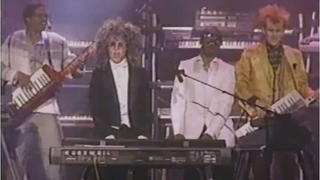If you are old enough to remember the '80s, then the classic clip of Herbie Hancock, Stevie Wonder, Thomas Dolby and Howard Jones playing the Grammys in 1985 will send you right back, slap-bang back into the middle of the decade of mullets and handheld synths.
And if you’re not old enough to recall this ‘colourful’ time, then watch and learn youngling. This is the decade you missed, summed up in just under five glorious minutes.
Yes, this video of Stevie , Herbie, Howard and Dolby playing a synth medley at the 1985 Grammy Awards is the most ‘80s thing ever committed to video, historians will probably confirm later today. In fact it wouldn't have been any more '80s even if Glenn Close had come on stage and boiled a rabbit in a pan while they played.
It wouldn't have been any more '80s even if Glenn Close had come on stage and boiled a rabbit in a pan while they played.
It’s a performance that features four of the most well-known keyboard players of that era coming together on stage at the 27th annual Grammy Awards to play a medley which became known as 'the Great Synthesizer Showdown of ‘85'.
Why did it happen? Well, we'll come to that later. For the moment, sit back and just drink it in. To witness these synth icons in full flow always makes our day – year, even (certainly Christmas) – and to get a lesson in synth history from the compère of the show (which you can see below)... well that’s just the icing on the ‘80s Black Forest Gateaux.
We’ve been digging around the photo archives for that particular Grammy Awards show and it gets even better. Or at least even more '80s. Here’s the winner of Best New Artist Grammy, Cyndi Lauper, being carried by Hulk Hogan. Of course she is!

And in the interests of this story being more related to music production – and not just an excuse to look back and laugh at history – here's producer and songwriter Terry Britten picking up one of two awards for Record of the Year and Single of the Year with Tina Turner, for What's Love Got To Do With It.

And more '80s feels with Lionel Ritchie picking up an Album of the Year Grammy for Can't Slow Down.

But as curious and '80s as the four-headed mega performance was at the top of this story, for us, the entire show was stolen by compère John Denver who introduced the whole performance with a lesson in synth history. John Denver on synths! Watch him intro the piece in this extended cut.
He correctly pronounced Moog 'Mogue, not Moog' and then detailed the intricate processing power of the synthesizer and its main aim of replicating real instruments. (Incorrect, really, but that's what people wanted them to do back then, so we'll let him off this time.) He then correctly pointed out the pioneering importance of Wendy Carlos before introducing the wonder quartet.
“There's no doubt that when the musical history of the 20th century has been written, one of the major chapters will highlight the influence of electronic keyboards,” Denver said.
“And that a section will be devoted to Stevie Wonder, who helped bring them into the use for pop music; to Herbie Hancock, who elevated [synths’] use in jazz to an incredibly new level; to Howard Jones and to Thomas Dolby, whose exciting use of electronic technology is helping to shape the music of the ‘80s.
"Sit back and hold on your seats, folks. This place might really explode!”

Indeed it did, and that was completely the desired effect according to Howard Jones. In 2020, he revealed the story behind the event to Yahoo, stating that the Grammys organisation wanted to celebrate the 'arrival' of the synthesizer.
It was a celebration of keyboard players using new technology and making great music with it.
Howard Jones
"The Grammys really wanted to mark the arrival of electronic instruments and sort of give it, I don’t know, a bit of credibility," Jones said. "And they wanted to use great legends, like obviously Stevie Wonder, and some new voices as well, like me and Thomas Dolby.
"It was a kind of celebration of keyboard players using new technology and making great music with it. I think it was a great move, and I think it really did mark a sort of turning point for electronic music."

"You have to remember," he continued, "that Queen used to put on one of their albums: 'No synthesizers at all used in the making of this record.' When you start out doing these new things, there’s always going to be a reaction. I suppose that’s just the way it’s always been.
You have to remember that Queen used to put on one of their albums: 'No synthesizers at all used in the making of this record.'
Howard Jones
"But that [Grammy] moment kind of swept that away. I think people were like, 'Oh wow, these are musicians and they’ve got brains and they write; they’re just using a different instrument.' So I think that was a moment that changed things."
Jones also admitted that, as impactful as the performance undoubtedly was, not all of it was live.
"I don’t think anybody would have been brave enough to play everything live," he said. "So we played some things over the top of it, and then the rest of it was pre-done in studio. I think that’s the only way to have achieved it for the Grammys. I think it would have been very risky otherwise!"
So there you have it: bonkers, brilliant and, as it turned out, quite an important event in the history of the synth. Maybe we can get Ricky Gervais to give a lesson in sampling to the assembled victims if ever he decides to do the Golden Globes again.




